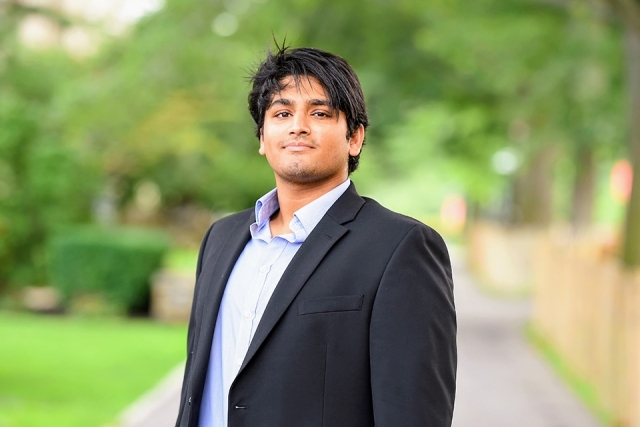
This summer, after earning a highly competitive Critical Language Scholarship (CLS) from the US Department of State, a graduate student at St. John’s University is studying Arabic.
Ammaar A. Dawood, who is expected to complete a Master of Arts degree in Government and Politics at St. John’s Rome, Italy, campus in 2023, with a specialization in International Relations, is learning the language in an online format after the pandemic prevented him from attending classes at the Noor Majan Institute in Oman, a Middle Eastern country. He earned a Bachelor of Arts degree in Government and Politics, with the same specialization, in May from St. John’s College of Liberal Arts and Sciences.
Ammaar is one of nearly 700 American students attending US colleges and universities who received the scholarship this year. The Critical Language Scholarship program is part of an effort by the US government to expand the number of Americans studying and mastering foreign languages.
“I have a love of languages and foreign cultures, and I am fascinated by history and politics. You can’t truly appreciate the complexities of a different culture if you don’t engage with people from that culture. Often, language can be a huge barrier to that,” said the Flushing, NY, resident, who is considering careers in the US Foreign Service and political sectors. “As someone who loves traveling the world and meeting new people, I find that nothing is more powerful in creating a new connection than language.”
The CLS program provides opportunities for US undergraduate and graduate students to spend eight to 10 weeks studying one of 15 critical languages: Arabic, Azerbaijani, Bangla, Chinese, Hindi, Indonesian, Japanese, Korean, Persian, Portuguese, Punjabi, Russian, Swahili, Turkish, or Urdu. The program includes intensive language instruction and structured cultural enrichment experiences conducted virtually and designed to promote rapid gains in learning languages.
“We have done weekly cultural sessions in a traditional Omani market, haggling over goods, as well as one in which we toured famous Omani mosques,” Ammaar said.
The CLS program is developed in partnership with local institutions in countries where these languages are commonly spoken. CLS scholars are expected to continue their language study beyond the scholarship and apply their critical language skills in their future careers.
Ammaar, a Muslim American, was exposed to the Arabic language during his childhood. “The language we speak at home, Urdu, is full of Arabic words and is actually written in an Arabic script. My name is of Arabic origin,” noted Ammaar. “But my real interest in learning the language was actually a byproduct of my interest in Middle Eastern and North African politics.”
While studying Arabic for two months in 2017 through another US State Department scholarship, the National Security Language Initiative for Youth (NSLI-Y), Ammaar lived in Marrakech, Morocco, with a host family. He additionally took courses in Arabic at St. John’s.
“St. John’s gave me the platform to really develop as a student and pursue my passions,” he said. “Last semester, I received permission to take a master’s course on the international law of war, simply because I was fascinated by the subject and wanted to challenge myself. It did not count toward my master’s degree.”
The course was taught by Azzedine Layachi, Ph.D., Professor of Government and Politics and a mentor for Ammaar. “In several discussions during my office hours, Ammaar exhibited not only a great interest in the Middle East, but he also knew more about it than many people.”
Unsurprised that Ammaar was awarded the CLS, Dr. Layachi said, “This brings him one step closer to becoming a young Middle East expert who is keen on helping to find solutions to the problems that have been afflicting that region for decades.”
“I feel lucky,” Ammaar said, “that at a school as large as St. John’s, we still are able to engage very easily with professors and department heads.”
Related News
Research, Memory, and Respect: A St. John’s Student at the African Burial Ground
St. John’s University graduate student Sebastian Loiseau spent his summer in a sacred space—a reminder of a shameful period in US history, and a place where remembrance, research, and respect come...
St. John’s Alumni Share How Core Coursework Impacted Career Development
St. John’s University welcomed first-year students to a career development event designed to reinforce how the University’s core curriculum and early coursework build competencies that support long-term professional success.
St. John’s Student-Led Event Teaches High School Students Responsible AI Use
A unique workshop led by St. John’s University First-Year Seminar students introduced high school students to the responsible use of artificial intelligence (AI).
